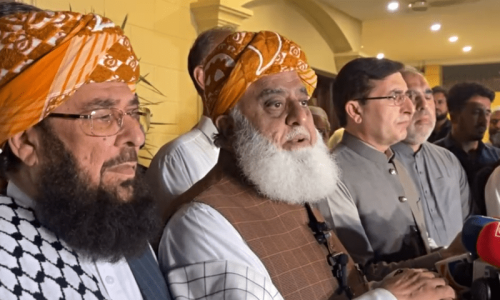WASHINGTON, March 7: US Vice President Dick Cheney told Iran on Tuesday that enrichment of nuclear fuel on Iranian territory was unacceptable and warned that Tehran would face “meaningful consequences” if it continued to pursue its nuclear programme.
“The Iranian regime needs to know that if it stays on its present course, the international community is prepared to impose meaningful consequences,” Mr Cheney said in a speech to the pro-Israel lobbying group, The American-Israel Public Affairs Committee.
“For our part, the United States is keeping all options on the table,” he said. “We will not allow Iran to have a nuclear weapon.”
The warning followed talks between US Secretary of State Condoleezza Rice and Russian Foreign Minister Sergey Lavrov in Washington on Tuesday, during which Russia appeared to close ranks with the United States over Tehran’s nuclear programme.
Later at a joint news conference, Ms Rice delivered a tough message - but shied away from warning of immediate UN sanctions. Mr Lavrov said there was no compromise in sight with Iran.
Russia has been negotiating with Iran and has proposed enriching fuel on Russian soil for Iran’s energy needs.
White House spokesman Scott McClellan said earlier that “the international community has spelled out what Iran must do - that means suspend all enrichment activity.”
Mr McClellan’s comments came ahead of President Bush’s scheduled meeting with Mr Lavrov.
The International Atomic Energy Agency already has referred the Iranian nuclear issue to the UN Security Council, a move spearheaded by the Bush administration. “We will see what is necessary to do in the Security Council,” Ms Rice after talks with her Russian counterpart said. She said there was still time for Iran to change its ways.
Later, Ms Rice telephoned IAEA chief Mohammed ElBaradei “to reiterate the US position that Iran should cease all enrichment-related activity,” said State Department spokesman Tom Casey.
In response, Mr ElBaradei agreed that Iran must not be allowed to have enrichment activity on its territory, said a US official. But diplomats familiar with Mr ElBaradei’s stance questioned the US version of Mr ElBaradei’s position.
On the other hand, Mr Cheney indicated that the Iranian nuclear dispute may soon go before the Security Council.
“The Iranian regime needs to know that if it stays on its present course, the international community is prepared to impose meaningful consequences,” said Mr Cheney said in his speech to the AIPAC.
“We join other nations in sending that regime a clear message: we will not allow Iran to have a nuclear weapon,” he said.














































Dear visitor, the comments section is undergoing an overhaul and will return soon.